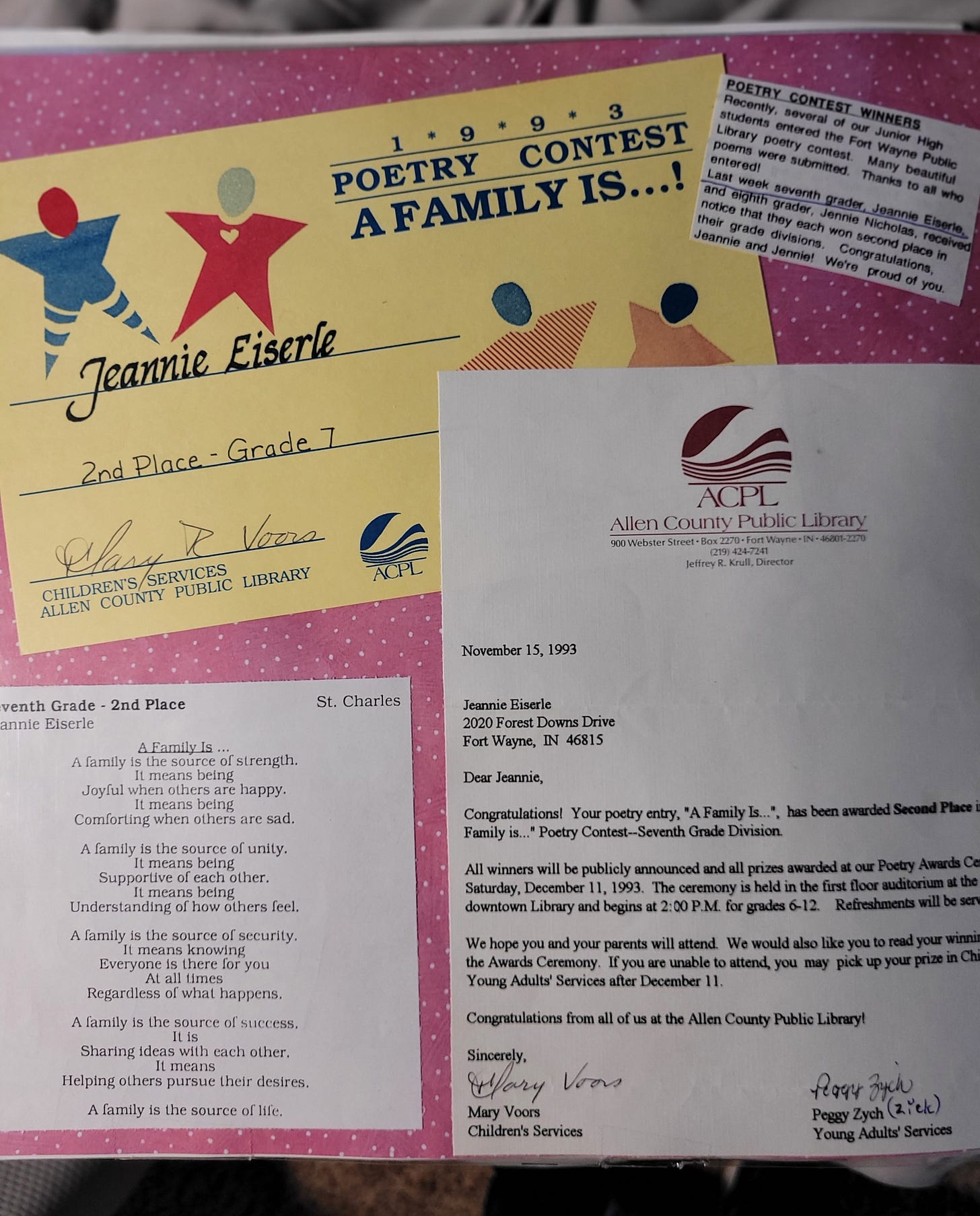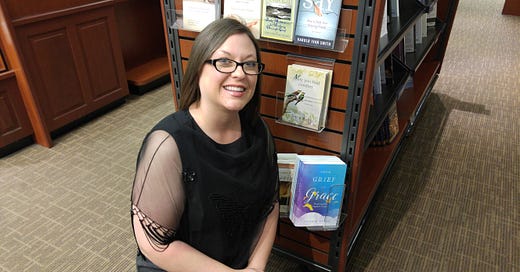
The seed of desire
I am five years old. I am sitting on the floor of my bedroom, which I have made into my sanctuary, scattering ephemera and trinkets on the floor from a ceramic baby shoe that was likely gifted to me during my infancy. Inside are pocket-sized cards - images of angels, mostly - a necklace, a whimsical bunny pin in cotton-candy pink, and other things I can’t recall. But here’s the important part of my memory: I remember what I thought as I gingerly laid out each treasure.
Someday I want to grow up and do great things with my life.
It was a startling desire, especially for my not-yet-kindergarten-age self. But it was not obfuscated by childish naivete or caprice. Stark, clear, and certain, I repeated it to myself, then to God as a prayer: Please help me grow up and do great things with my life.
From that moment onward, I strove for excellence in everything I pursued. Mostly, this involved the arts, many forms: acrylic painting, watercolors, art history, monochromatics, pencil sketching, reading, and writing both prose and poetry. I holed myself up in my room from the instant I entered the threshold of our house after a long day at school until I was summoned for dinner. Creativity was an innate way of being for me, but I didn’t realize it. I didn’t have language for what was happening inside of me.
The trap of external validation

As I entered upper elementary school, I stretched outside the confines of my bedroom to begin sharing my art. To my surprise (and delight), my work was often selected for awards and prizes. As I write this, I remember a poem I entitled “A Family Is” was chosen for placement in our county’s public library compilation of poetry submitted by local elementary students. One of my sketches of the Madonna and Child became the cover art for our school’s Christmas play. And an essay I wrote in sixth grade about world affairs in the 1990s was chosen to be placed in the city’s time capsule, which was unearthed 25 years later.
Time and again, my art was validated by my school, my municipality, my family. I interpreted this to mean that I’d landed upon that something to make my life great, so I immersed myself in creating for hours upon hours. This was my first love, and as an introvert who preferred my inner world to the frenzied overstimulation of my external environment, I believed I would always somehow receive a nod from the experts, telling me that I’d stood out to them. That my work was important. That it mattered.
That I mattered.
I began writing for publication shortly after Sarah’s birth in 2013. Ten years later, I sit here writing this with a forlorn sense of uncertainty. A fragility, I suppose, in not knowing whether my writing finds its way to the hearts of strangers like it used to. I say this now, in this space, because I struggle with a deep insecurity that, in order for my life to mean something, my writing must be accepted. Needed. Chosen.
And, largely, it’s not. In fact, I hate logging on to my Substack’s dashboard, because I don’t want to see the stats that tell me how many people have unsubscribed from my newsletter. Every time I click publish, I hold my breath and feel foolish for basically stripping myself bare of the layers of defenses I’ve built over many decades - and then some people clearly don’t want to hold my heart. They say no thanks.
I take this as a personal rejection, even though I know rationally it is not. But the wound comes from a deeper place inside me, one I am still unveiling every day as I seek to understand myself, my creative work and its place or value in this current society and era, and the world around me.
But the truth is, I do not understand the world around me. I never have. Even as a five-year-old girl, I tucked myself inside a multidimensional imagination, because it was my haven away from the voices of those whom people listened to - the ones who spoke loudly, whose passion was reflected in their charismatic speeches. I did not have the same charm as my extroverted peers, and I knew that. Mine was a quiet flame, in which I felt and thought about everything quite deeply. But instead of contributing to the noise outside of myself, I turned inward and created something from those composting ideas, perceptions, and viewpoints.
Now I am approaching my mid-forties, and I still feel like that little girl when I sit down to write. Not when I journal, because I relinquish the petulant grousing to the page, and I feel better because of it. But what lingers is the sense of feeling small and swallowed by the world, and I cannot shake it throughout the day. It’s this gnawing belief that my words do not matter on a larger scale, and that they never will. That what I am doing here, as with every time I have published an article or book, might touch one or two people’s lives, but the message is largely lost to the din of bigger, more powerful and influential literary artists around me.
I am not among them. In a way, I wish I were. I wish that every time I read a writer’s impressive bio about their MFAs from a prestigious ivy, about their accolades and writers’ residencies and literary awards, that I could be included among them. That someone in the publishing industry might eventually, one day, look at my own work and say - as they once did when I was young and impressionable - that it excels in some way, stands out among the clatter of people’s voices trying to vie for their viral moment.
Honor the work that is calling your name.
There’s really nothing to figure out about your art - not why you’re doing it, or what it will become, or whether the outside world will receive it well or understand it. All you must do is follow the work that is calling your name, to honor it by listening to how it wants to be developed inside you and to know that it will materialize how, when, and why it wants to.
Every day, I want to quit writing. Every day, I don’t. For a long time, I was puzzled as to why I kept doing a thing that didn’t seem to be going anywhere, at least in my estimation. But I was reading memoirs and finding myself not in the generalizations, but in the specifics of their stories about existential loneliness, about doubt, about feeling like a fraud. Even in a speech I once listened to while cleaning the kitchen, Anne Lamott said, “I never want to write. But I do. Every day.”
The relief in knowing that a fantastic author whom I’ve admired for many years doesn’t want to write struck a nerve inside of me. I realized that I don’t write because of following the proverbial American Dream. I write, because I must. I write, because there is a strand of insights and inspirations that live inside the recesses of myself that are bursting to emerge on the page. I write, because there is an ache that builds in my heart when I don’t.
So, I carry on. I don’t create masterpieces that I believe will leave some indelible mark upon history. I’m not aiming for that, though I hope to impart a legacy in some way that extends beyond my own family and small circle of friends. But what I do is practice, in the form of jotting down a word or phrase I hear from a conversation while I waiting to see a physician, or a strand of poetic verse sandwiched in an ordinary voicemail from a friend, or a lyric from a song that repeats itself in my mind.
And I journal. I know most of it is drivel, but I’ve come to a place of accepting that my creative work can be bad. That I don’t have to always be in The Flow. And I don’t need to follow the “sparkly breadcrumbs”1 all the time. Sometimes creative work involves drudgery. Often, it is done in secret. It is arduous and lonely and painful at times, but not because the artist necessarily fits this romantic construct of the manic-depressive outlier. It’s just hard to continue doing something that requires you to access the deepest parts of yourself, time and again, every day.
Being a writer isn’t what I do. I no longer view it as something separate from myself. It is interwoven into my being, into who I am as a person. It is one of many aspects of my identity, but mostly, it is how I view the world. What moves my heart sometimes is birthed as an insightful essay or a thoughtful reflection. Sometimes it gestates a while, because it is a seed that needs more time to flourish or be fully actualized. And I’m learning that who I am as an artist needn’t be contingent upon whether I am ever recognized as a commercial success.
Rick Rubin tells the reader in his book, The Creative Act, that there’s really nothing to figure out about your art - not why you’re doing it, or what it will become, or whether the outside world will receive it well or understand it. All you must do is follow the work that is calling your name, to honor it by listening to how it wants to be developed inside you and to know that it will materialize how, when, and why it wants to. The only job of the artist is to make the art that’s woven into - and from - the fabric of her experience, her temperament, her perspective, her knowledge.
There is no one who has ever lived or will ever live who can bring forth the beauty that comes from your life, or mine. Each of us is presented with the choice and the chance to bear what is both burden and blessing. Then, we give homage to what manifests, without asking it to become what it was never intended to be.
To quote the term coined by Shaelynn Parker Richardson.





I admire your tenacity to write, even when you don’t want to. As an extrovert, my need to write can be easily trumped by distraction, chasing after my emotions, or following other more mundane creative pursuits. You have inspired me to write everyday. Thank you!
I relate to much of what you say here. In some ways we are the victim of our early success, and that places such a burden of expectation on us! I'm continually reminded to focus on the process rather than the outcome and any commercial success or accolades that may follow. The end is so fickle, ultimately, that we must only please ourselves. Anything else is really a bonus and icing on the cake. I value your writing and hope that you continue to find reward in the act itself.